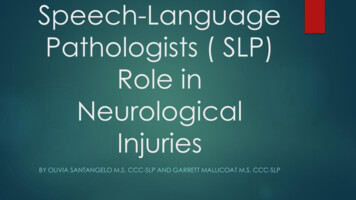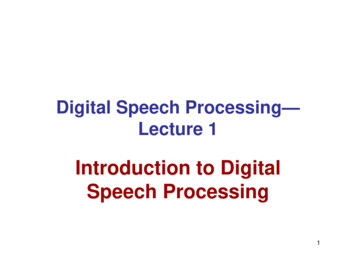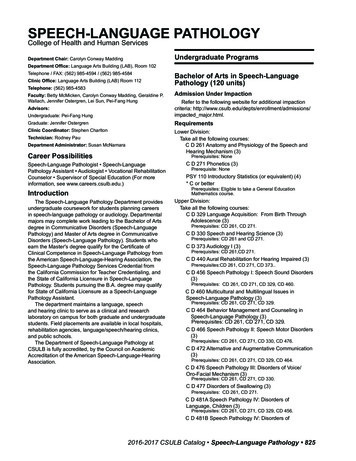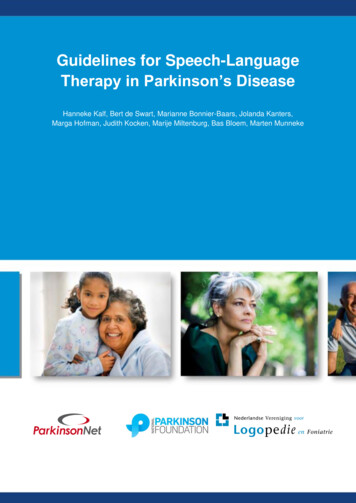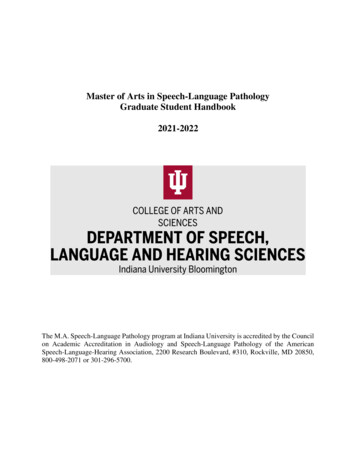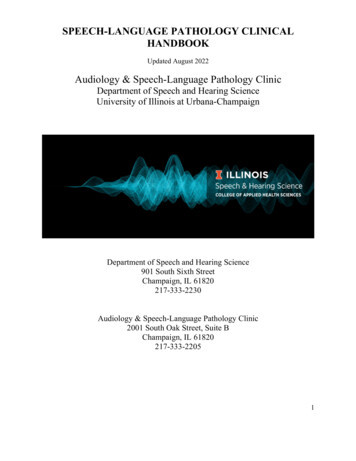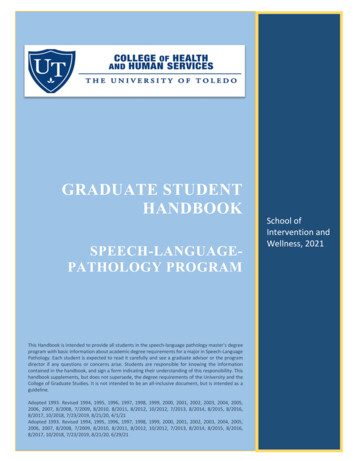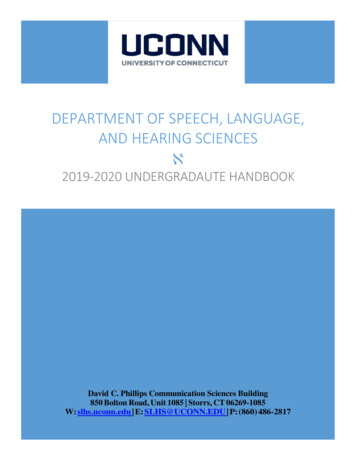
Transcription
DEPARTMENT OF SPEECH, LANGUAGE,AND HEARING SCIENCES 2019-2020 UNDERGRADAUTE HANDBOOKDavid C. Phillips Communication Sciences Building850 Bolton Road, Unit 1085 Storrs, CT 06269-1085W: slhs.uconn.edu E: SLHS@UCONN.EDU P: (860) 486-2817
Table of ContentsIntroduction .2Brief overview of the profession .2Declaring the Major & Advising .2SLHS Curricular Requirements .3Courses in the SLHS Major .3Related Courses .4School Certification for Speech-Language Pathologists .5Transfer Credits .5Study Abroad .6Enhancing Your Degree .6Undergraduate Research .6Child Development Labs .7Observation Opportunities.7Honors Program.8Student Organizations .8The Faculty and Their Research Interests .101
IntroductionThe Department of Speech, Language, and Hearing Sciences (SLHS) studies the normaldevelopment of speech, language, and hearing as well as the understanding and clinical managementof disorders in these processes. The undergraduate program in SLHS leads to a Bachelor of Artsdegree. Courses in the program offer students basic information about normal and disorderedcommunication. Directed clinical observation is also offered. This area of study may be attractive tothe student who has a strong academic background and who is comfortable in learning how to applyinformation from the biological, physical, and social sciences to the assessment and management ofindividuals with language, speech and hearing disorders.The undergraduate program provides students the opportunity to assess their interest and aptitude forgraduate training in speech-language pathology and audiology. A graduate degree is required forentry into the profession and the undergraduate program in SLHS prepares students to apply forgraduate education in either Speech- Language Pathology or Audiology; consequently studentscompleting the undergraduate major are not prepared to work as independent professionals. Thestudent who successfully completes the undergraduate program and who wishes to becomeprofessionally qualified to seek employment as a speech-language pathologist or audiologist mustapply to a graduate program offering a course of study leading to a Masters (for speech-languagepathology) or Doctoral (for audiology) degree. It is at the graduate level that professional trainingfocuses either on speech-language pathology or audiology. The Masters or Doctoral degree isrequired for certification by the American Speech-Language-Hearing Association (ASHA). Alongwith the graduate degree, further requirements for certification include passing the National BoardExamination in speech-language pathology or audiology, and successful completion of the ClinicalFellowship Year for speech-language pathology. Admission to graduate programs in either speechlanguage pathology or audiology is competitive. Successful applicants present a strong academicrecord, typically with a Grade Point Average (GPA) of 3.7 or higher, overall as well as in their major.Brief overview of the professionA speech-language pathologist is a person trained to diagnose and treat communication disorders.An audiologist is concerned with hearing and is trained to provide diagnostic audiological services,hearing aids/cochlear implants, and auralrehabilitation for the hearing impaired. Counseling for thecommunicatively handicapped person and parents or other family members is an important aspectof the work of both the speech-language pathologist and the audiologist.Declaring the Major & AdvisingStudents can declare Speech, Language, and Hearing Sciences (SLHS) as a major by logging intoppc.uconn.edu. Upon declaring the SLHS major, all students are assigned a faculty advisor. Inaddition to their faculty advisor, first and second year students (54 credits or less) are also assigned astaff advisor, Sarah Mosier. First and second year students should use Sarah as their primaryacademic advisor while juniors, seniors, and honors students should seek advisement from their SLHSfaculty advisors. Juniors and seniors who are unable to meet with their SLHS faculty advisors mayalso see Sarah as needed.Students are expected to make an appointment with their advisors as soon as one is assignedand at least once during each academic session. During these meetings, a plan of study(POS) will be created that will meet both the College of Liberal Arts and Sciences’ GeneralEducation Requirements and the department's specific requirements. The POS is the formal2
document specifying what is required for you to complete your degree.During midterms, advisors are informed if an advisee is in danger of failing a course for thesemester. When students receive that notification, he or she should make an appointment with theiradvisor to discuss the situation. Additionally, advisors will also talk with their advisees about theirgeneral progress in keeping their GPA in line with expectations for graduate school admission.To schedule an advising appointment with a faculty advisor please use advapp.uconn.edu. To schedulean advising appointment with Sarah please call 860-486-2822.Students considering the SLHS major are encouraged to schedule a meeting with Sarah to discuss theSLHS major and address any questions.SLHS Curricular RequirementsTo graduate with an SLHS major, students must complete: 25 SLHS major credits 12 credits of related coursework All CLAS general education requirementso Biology: BIOL 1102 OR 1107 OR 1108*o Physics: PHYS 1010Q OR 1075Q*o Statistics: STAT 1000Q OR 1100Q AND 2215Q*More advanced level courses may be substituted for these courses* 45 credits at the 2000 level or above All major courses with a 2.0 or higher 120 credits with a cumulative GPA of a 2.0 or higherCourses in the SLHS MajorStudents pursuing a bachelor’s of arts degree in SLHS must complete at least 25 credits of SLHSmajor coursework. The SLHS curriculum consists of 18-19 credits of core coursework and 6-7credits of elective courses. All students must successful complete the following core courses:Core CourseSLHS 2156Q: Speech & Hearing ScienceCredits3SLHS 2203: Anatomy & Physiology of Speech, 3Hearing, & SwallowingSLHS 2204: Speech and Language AcquisitionSLHS 3247: Introduction to PhoneticPrinciplesSLHS 3248: Introduction to Audiology33SLHS 4249/W: Introduction to AuralRehabilitation3/43Pre-RequisitesSoph or higher (PHYS 1010Q or 1075Qhighly suggested)Soph or higherSoph or higherSLHS 2203 and SLHS 2156Q; ENGL1010, 1011 or 2011; juniors or higherSLHS 2203 and SLHS 2156Q; juniors orhigherSLHS 3248; ENGL 1010, 1011 or 2011;juniors or higher3
In addition, students must successfully complete a W course and one of the following electivesequence: Either one Language Disorders course (SLHS 4245/W OR SLHS 4254/W) and a SpeechDisorder (SLHS 4251) course, OR 2 Speech Disorder courses (SLHS 4245/W OR SLHS 4254/W).Students considering a graduate degree in audiology (i.e., Au.D.) must take both a speech disordersand a language disorders course. We strongly recommend that students take SLHS 4251 AND SLHS4245/W OR SLHS 4254/W.Elective Course OptionsSLHS 4123: Bilingualism in Typical and AtypicalPopulations: Language and CognitionSLHS 4245/W: Neuroscience Study Cognitive &Communication Disorders Credits Prerequisites3Junior or higherSLHS 4251: Introduction to Articulation, Voice andFluency Disorders*SLHS 4254/W: Introductions to LanguageDisorders in Children SLHS 4376: Language Impairments and Literacy33/43/43SLHS 2203 and SLHS 2204;juniors or higher; (with W:English 1010, 1011, or2011)SLHS 2156Q, SLHS 2203and SLHS 3247SLHS 2204 (with W: English1010, 1011, or 2011)SLHS 2204, SLHS 3247, andSLHS 4254 Language Disorders Course* Speech Disorders CourseAdditional Course OfferingsSLHS 4296W: Senior ThesisCredits3PrerequisitesEnglish 1010, 1011, or2011; juniors or higher;instructor consentSLHS 3299: Independent StudyVariesJuniors or higher; instructorconsentSLHS 4296W and 3299 are options for honors or other students of advanced standing. Both coursesrequire the consent of an instructor or thesis director.Students can complete their SLHS major courses in 3 – 5 semesters. Suggested SLHS sequences areavailable on the SLHS Resources page.Related CoursesIn addition to 25 SLHS major credits, the department requires that students complete twelve creditsof 2000 level or above courses taken outside of the SLHS department that are related to the major.These do not have to be from the same department. Ordinarily courses from Allied Health,Anthropology, Human Development and Family Studies, Linguistics, Psychology, Sociology,Education, and Biology are selected for related coursework. A list of pre-approved related courses isavailable on the SLHS Resources page.Other courses may be used to satisfy this requirement with permission of the advisor. If you wouldlike to use a class not on the pre-approved list, please contact your advisor and provide a written4
explanation (about a paragraph per class) about why this class should be counted towards yourrelated coursework. Your advisor will approve or deny the request as necessary.School Certification for Speech-Language PathologistsSpeech-language pathologists who work in the Connecticut public schools must have schoolcertification. Through an arrangement with the NEAG School of Education, students enrolled inUConn’s M.A. program in SLP can fulfill requirements leading to certification as an SLP foremployment in Connecticut's public schools. Requirements include course work in SpecialEducation, Regular Education, Human Development or Psychology, Classroom Instruction andManagement, and Health. Although completion of these requirements requires a Master’s Degree,students planning to acquire this certification may begin meeting some of the requirements as part oftheir undergraduate program. The following courses meet requirements for school certification inConnecticut and can be completed during a student’s undergraduate career:Course TitleEPSY 3010HDFS 2100HDFS 3103PSYC 2400PSYC 2500PSYC 2501PSYC 3400Educational PsychologyHuman Development: Infancythrough AdolescenceAdolescence: Youth andSocietyDevelopmental PsychologyLearningCognition and ProblemSolvingChild PsychologyTransfer CreditsTo graduate from the University of Connecticut a student must complete at least 30 credits inresidence and meet all general education and major requirements. In addition, a majority of majorcredits (51%) must be completed at the University of Connecticut to receive a UConn SLHS degree.The Speech, Language and Hearing Sciences (SLHS) department has reviewed the speech-languagepathology coursework at Sacred Heart University, and the coursework in Communication Disordersat Southern Connecticut State University to determine their equivalence to the UConn SLHScurriculum. For information about how each institution’s respective courses would transfer to theUniversity of Connecticut’s Speech, Language and Hearing Sciences undergraduate curriculum pleasesee the SLHS Transfer Equivalencies document available on the SLHS Resources Page:http://s.uconn.edu/SLHSResources.After students have successfully completed the course with a grade of a C (2.0) or better, studentsshould send their final official transcript to Transfer Admission (University of Connecticut Office ofUndergraduate Admission 2131 Hillside Rd. Unit 3088 Storrs, CT 06269-3088). Transfer creditsare evaluated and posted to students’ UConn transcript during a six week period beginning on thefollowing dates: January 15, June 15 and September 6. It is important that students’ final transcriptsare received by Transfer Admissions prior to these dates so that their credits will be applied totheir UConn transcript as soon as possible to avoid enrollment difficulties.5
Education AbroadThere are a number of Education Abroad opportunities SLHS which students can participate. It isrecommended that students who are considering the Study Abroad program should consult withtheir academic advisor about how this will affect the sequence of their courses.Enhancing Your DegreeWith careful planning, SLHS majors may pursue a second major offered within the College of LiberalArts and Sciences (CLAS) or a minor from any school or college. Common double majors includePsychology, Linguistics and Human Development and Family Studies (HDFS). Common minorsinclude Physiology and Neurobiology, Cognitive Science, American Sign Language, Spanish,Linguistics, Music, Human Development and Family Studies (HDFS), Neurobiology, Psychologyand Molecular and Cellular Biology (MCB).Transfer credits can be applied to major requirements only with approval of faculty advisor and the CLASdean.Study Abroad courses receive UConn credit. Check with your advisor to determine if courses will beapproved for major and/or related requirements.Additional Degree: With 30 additional credits in courses at the 2000 level (i.e. 150 total credits) studentscan earn an additional UConn degree (restrictions apply; see catalog.uconn.edu).Undergraduate ResearchUndergraduate research involves an educational collaboration between a student and facultymembers. There are many advantages to engaging in undergraduate research. Generally, studentsacquire practical tools vital to their education and future career, enhance their critical thinking skills,increase their self-confidence implement classroom knowledge to real-life situations. Undergraduateresearch experiences may be initiated by a student who seeks out faculty supervision or by a facultymember who involves undergraduate students in her or his research team. While the university hasseveral opportunities, here are a few notable opportunities. The field of psychology is especially transferable within the SLHS field. With specialties inBehavioral Neuroscience; Development; Perception, Action & Cognition (PAC); Social; andClinical and Industrial/Organizational psychology, this field offers a variety of variedexperiences.o Students wishing to do research for credit should consider taking PSYC 3889. ThisPsychology Undergraduate Research allows students to earn credit for the researchthey participate in. With the research faculty, students can chose the number ofcredits they would like to invest in the research (1 – 6); psychology majors andminors should note that only 3 credits of PSYC 3889 or 3899 can be used towardsthe successful completion of the psychology minor or major respectively. Studentsare strongly encouraged to take PSYC 2100WQ before enrolling in PSYC 3889.PSYC 1100 and 1101 or 1103 are prerequisites for PSYC 2100WQ.The Office of Undergraduate Research (OUR) provides research-related opportunities andinformation to students interested in engaging in independent or collaborative research withfaculty members and research professionals. OUR provides funding opportunities for6
student research and scholarship through several sources, including OUR grants and theSummer Undergraduate Research Fund (SURF). In addition, OUR also sponsors andcoordinates Frontiers in Undergraduate Research, the annual spring poster exhibition thatshowcases student research projects.Child Development LabsTo understand disordered communication, students must first gain a deep understanding of thetypical trajectory of human development. The UConn Child Development Labs is a great place togain experience with children in the developmental stages from infancy to pre-school. Students willlearn about classroom development, behavioral management and leave with a deeper understandingof normal development and how to stimulate learning at different developmental stages. Studentsinterested in volunteering or working in the Child Development Labs should visit the website:http://childlabs.uconn.edu.Observation OpportunitiesThe faculty in SLHS regards opportunities to gain insight into the professions of Speech-LanguagePathology and Audiology as very valuable in making decisions about career paths, in examining theseamless transition between academic information and clinical application, and in appreciating all ofthe components of successful clinical interactions. We enthusiastically encourage all students decided and undecided about which career path to follow - to take advantage of the opportunities toobserve a wide variety of clinical activities. It is through this experience that students will betterunderstand their goals for becoming a speech-language pathologist or audiologist. Students whowish to pursue a graduate degree in Speech-Language Pathology are required to obtain 25 hours ofobservation in a variety of sessions provided by either a certified Speech-Language Pathologist orAudiologist. No observation hours are required for students pursuing a graduate degree inAudiology. Frequently asked questions, information about observations, and necessary forms can befound on the SLHS website at mpus ObservationsInformation regarding the University of Connecticut’s Speech & Hearing Clinic will be updated onthe SLHS website each semester.Off-Campus ObservationsOn the Department website, students will find a form to verify the certification status of theindividual who will supervise the off-campus observation, as well as general information aboutobservation and forms for the student to record the observational activity that are earned found onthe Department website.In addition to the completed observation form, the student should submit a brief (no more than onepage) report about the observation, focusing on three questions:1. What is the purpose of the observation? That is, what do you plan to accomplish, what do youwant to learn? Another way to think about this is to ask what you expect to know after theobservation.2. Did you achieve your purpose or learn what you expected to learn? If not, why not?3. What comments do you have about the observation? In other words, what did you like? Whatwould you want to change? What surprised you?7
All reports and forms should be returned to Dr. Nancy McMahon, Director of Clinical Education.The Honors ProgramThe Honors Program represents the University of Connecticut’s commitment to providing asuperlative educational experience to intellectually-able and highly-motivated students. Over 100Honors classes – limited in size and taught by some of the most highly-regarded faculty – areoffered each year. Honors students also experience the excitement of creation and discovery, andthe personal mentorship of a dedicated faculty advisor while completing the Honors Thesis, arequirement for graduation as an Honors Scholar.During the first two years, students enroll in Honors courses offered across the undergraduatecurriculum to fulfill University general education requirements or to prepare them for moreadvanced courses in their academic areas. Most also enroll in specially-designed Honors First-yearSeminars. Junior/senior Honors study is specific to each student’s major. Typical Honors work inthe major may involve special projects in major courses, departmental seminars, independent study,and graduate courses. To further students’ academic goals, certain privileges are extended to Honorsstudents, including priority class registration, graduate level library lending privileges, and increasedallowance in semester-credit-hour enrollment.Beyond the enriched academic program, Honors students also have the benefits of a speakers’series, the support and guidance of a faculty mentor in SLHS, participation in special social events,and membership in a community of scholars and learners. This will be reflected on the studenttranscripts and with a letter of commendation by the president of the university. For moreinformation, students can contact either their academic advisor in SLHS or visit the Honors websiteat honors.uconn.edu.Student OrganizationsNSSLHA ChapterThe National Student Speech-Language-Hearing Association (NSSLHA) is a national organizationfor graduate and undergraduate students interested in the study of normal and disordered humancommunication. NSSLHA has approximately 18,000 members with chapters in more than 285colleges and universities. Visit the national page for NSSLHA, www.nsslha.org, for information aboutmembership and local activities.SAA ChapterThe Student Academy of Audiology is the national student organization of the American Academyof Audiology that serves as a collective voice for students and advances the rights, interests, andwelfare of students pursuing careers in audiology. The SAA introduces students to lifelonginvolvement in activities that promote and advance the profession of audiology, and providesservices, information, education, representation and advocacy for the profession and the public weserve. For more information visit: ssa.audiology.org.Hear For YouHear For You is an organization that provides mentoring and support for children and adults withhearing disabilities and speech impairments through hands on activities. This organizations strives toraise awareness of the population through special events and fundraisers at UConn. The members ofHear For You meet weekly and participate in various community events each month. The weeklymeetings consist of event planning, membership bonding, and professional development8
presentations. This club is especially beneficial for students considering a career in Speech-LanguagePathology or Audiology fields, but ALL majors and interests are welcome and encouraged to join!Language For AllLanguage For All is a student organization with the goal to promote awareness of languagedevelopment with an emphasis on underrepresented groups (e.g. low SES, developing nations,bilinguals) and language systems (e.g. sign language). The members actively advocate for languageaccess through education and service. New members are always welcome!Create and CommunicateCreate & Communicate is a student organization uses art to enhance a patient’s speech and languagedevelopment. Created by SLHS UConn students, members visit local hospitals and engagepatients in conversation outside of their network of family members and doctors. This organizationis open to all majors is meant for educational purposes.9
THE FACULTY AND THEIR RESEARCH INTERESTSKathleen Cienkowski, AssociateDepartment Chair/Associate Professor; Ph.D.,University of Minnesota.Audiology. Auralrehabilitation and hearing aids.Carl Coelho, Professor; Ph.D., University ofConnecticut. Neurological disorders inadults, discourse following grain injury.Nicole Gallagher, Associate ClinicalProfessor; M.A., Boston University.Clinical supervision; alternativeaugmentative communication, andpediatric speech disorders.Lendra Friesen, Assistant Professor; Ph.D.,University of Washington. Audiology.Cochlear implants, auditory evokedpotentials, and speech perception.Adrian Garcia-Sierra, Assistant Professor;Ph.D., University of Texas at Austin.Speech perception, bilingualism, languagedevelopment, and event-relatedpotentials.Bernard Grela, DepartmentChair/Associate Professor; Ph.D.,Purdue University. Languagedisorders in preschool children andchildren with SLI.William Hinchey, Assistant ClinicalInstructor, Au.D., Townson University.Clinical education, diagnosticassessment amplification and auralrehabilitation, and vestibular assessmentrehabilitation.Jean McCarthy, Lecturer II; M.S., Universityof Rhode Island. Clinical supervision inspeech-language pathology.Nancy McMahon, Director of ClinicalEducation & Clinical Professor;Au.D., Central Michigan University.Clinical supervision in audiology.Avinash Mishra, Assistant Professorin Residence, Ph.D., ColumbiaUniversity. Evidence-based evaluationand treatment protocols of airwayprotection in individuals withdysphagia & dystussia.Jennifer Mozeiko, Assistant Professor;Ph.D., University of Connecticut.Aphasia rehabilitation, functionalneuroimaging.Emily Myers, Associate Professor; Ph.D.,Brown University. Cognitiveneuroscience of speech and language,aphasia, speech perception, neuroimaging(FMRI and ERP).Christine Njuki, Lecturer II; Au.D., A.T.Still University Arizona School ofHealth Sciences. Clinical supervision inaudiology.Jill Raney, Assistant Professor inResidence; Ph.D., University of Florida.Educational and pediatric audiology.Erika Skoe, Assistant Professor; Ph.D.,Northwestern University. Plasticity of theauditory system, auditory evokedpotentials, and auditory neurophysiology.Lucinda Soares Gonzalez, Lecturer I;M.A., Southern Connecticut StateUniversity. Clinical supervision inspeech-language pathology.Rachel Theodore, Assistant Professor;Ph.D., Northeastern University.Perceptual learning, specificity effects inspeech perception and production,acquisition of phonological structure.Jennifer Tufts, Associate Professor; Ph.D.,Penn State University. Speech perceptionand hearing conservation.Kacie Wittke, Clinical Instructor, M.A.University of Connecticut. Clinicalsupervision, pediatric speech andlanguage disorders; autism spectrumdisorder and other neurodevelopmentaldisorders and pediatric dysphagia.Terry Yanaway, Lecturer II; Au.D, A.T.Still University Arizona School ofHealth Sciences. Clinical supervisionin audiology.10
Examination in speech-language pathology or audiology, and successful completion of the Clinical Fellowship Year for speech-language pathology. Admission to graduate programs in either speech-language pathology or audiology is competitive. Successful applicants present a strong academic record, typically with a Grade Point Average (GPA) of 3.7 .
